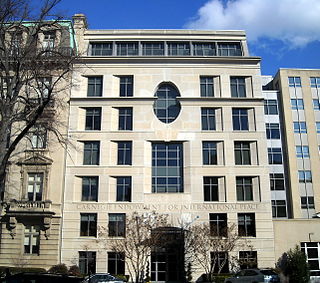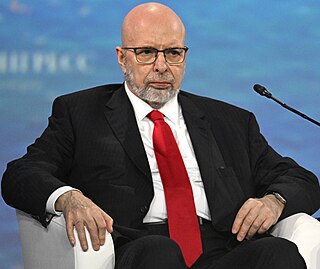Related Research Articles

A think tank, or policy institute, is a research institute that performs research and advocacy concerning topics such as social policy, political strategy, economics, military, technology, and culture. Most think tanks are non-governmental organizations, but some are semi-autonomous agencies within government, and some are associated with particular political parties, businesses or the military. Think tanks are often funded by individual donations, with many also accepting government grants.

The Hoover Institution is an American public policy think tank that promotes personal and economic liberty, free enterprise, and limited government. While the institution is formally a unit of Stanford University, it maintains an independent board of overseers and relies on its own income and donations. It is widely described as a conservative institution, although its directors have contested its partisanship.
The Heritage Foundation is an activist American conservative think tank based in Washington, D.C. Founded in 1973, it took a leading role in the conservative movement in the 1980s during the presidency of Ronald Reagan, whose policies were taken from Heritage Foundation studies, including its Mandate for Leadership.

The Brookings Institution, often stylized as Brookings, is an American think tank that conducts research and education in the social sciences, primarily in economics, metropolitan policy, governance, foreign policy, global economy, and economic development.
The Atlantic Council is an American think tank in the field of international affairs, favoring Atlanticism, founded in 1961. It manages sixteen regional centers and functional programs related to international security and global economic prosperity. It is headquartered in Washington, D.C. It is a member of the Atlantic Treaty Association.

The Carnegie Endowment for International Peace (CEIP) is a nonpartisan international affairs think tank headquartered in Washington D.C., with operations in Europe, South and East Asia, and the Middle East as well as the United States. Founded in 1910 by Andrew Carnegie, the organization describes itself as being dedicated to advancing cooperation between countries, reducing global conflict, and promoting active international engagement between the United States and countries around the world. It engages leaders from multiple sectors and across the political spectrum.

The National Interest (TNI) is an American bimonthly international relations magazine edited by American journalist Jacob Heilbrunn and published by the Center for the National Interest, a public policy think tank based in Washington, D.C., that was established by former U.S. President Richard Nixon in 1994 as the Nixon Center for Peace and Freedom. The magazine is associated with the realist school of international studies.

Dimitri Konstantinovich Simes is a Russian-American author, editor, and political pundit. He is the former president and CEO of The Center for the National Interest, where he served from 1994 to 2022. Simes was selected to lead the Center by former President Richard Nixon, to whom he served as an informal foreign policy advisor and with whom he traveled regularly to Russia and other former Soviet states as well as Western and Central Europe.

Robert Charles O'Brien Jr. is an American attorney who served as the twenty-seventh United States national security advisor from 2019 to 2021. He was the fourth and final person to hold the position during the presidency of Donald Trump. He is currently the chairman of the American Global Strategies firm advising companies on international politics, the U.S. government, and crisis management.

Richard R. Burt is an American businessman and diplomat who served as United States Ambassador to Germany and was a chief negotiator of the Strategic Arms Reduction Treaty. Prior to his diplomatic career, Burt worked as director of a non-governmental organization and from 1977 to 1980 was a national security correspondent for The New York Times.

The Russian government used espionage to interfere in the 2016 United States elections with the goals of sabotaging the presidential campaign of Hillary Clinton, boosting the presidential campaign of Donald Trump, and increasing political and social discord in the United States. According to the U.S. intelligence community, the operation—code named Project Lakhta —was ordered directly by Russian president Vladimir Putin. The 448-page Mueller report, made public in April 2019, examined over 200 contacts between the Trump campaign and Russian officials but concluded that there was insufficient evidence to bring any conspiracy or coordination charges against Trump or his associates.

This is a timeline of events related to Russian interference in the 2016 United States elections.

This is a timeline of major events in the first half of 2017 related to the investigations into links between associates of Donald Trump and Russian officials and spies that are suspected of being inappropriate, relating to Russian interference in the 2016 United States elections. Following the timeline of Russian interference in the 2016 United States elections before and after July 2016 up until election day November 8 and the post-election transition, this article begins with Donald Trump and Mike Pence being sworn into office on January 20, 2017, and is followed by the second half of 2017. The investigations continued in the first and second halves of 2018, the first and second halves of 2019, 2020, and 2021.

This is a timeline of major events in first half of 2018 related to the investigations into links between associates of Donald Trump and Russian officials and spies that are suspected of being inappropriate, relating to Russian interference in the 2016 United States elections. It follows the timeline of Russian interference in the 2016 United States elections before and after July 2016 up until election day November 8, the transition, and the first and second halves of 2017, but precedes the second half of 2018, the first and second halves of 2019, 2020, and 2021. These events are related to, but distinct from, Russian interference in the 2018 United States elections.

This is a timeline of events in the first half of 2019 related to investigations into the many suspicious links between Trump associates and Russian officials and spies relating to the Russian interference in the 2016 United States elections. It follows the timeline of Russian interference in the 2016 United States elections, both before and after July 2016, until November 8, 2016, the transition, the first and second halves of 2017, the first and second halves of 2018, and followed by the second half of 2019, 2020, and 2021.

This is a timeline of events related to Russian interference in the 2016 United States elections, sorted by topics. It also includes events described in investigations into the many suspicious links between Trump associates and Russian officials and spies. Those investigations continued in 2017, the first and second halves of 2018, and 2019, largely as parts of the Crossfire Hurricane FBI investigation, the Special Counsel investigation, multiple ongoing criminal investigations by several State Attorneys General, and the investigation resulting in the Inspector General report on FBI and DOJ actions in the 2016 election.

This is a chronology of significant events in 2016 and 2017 related to the many suspicious links between Trump associates and Russian officials and spies during the Trump presidential transition and the Russian interference in the 2016 United States elections. Following the timeline of Russian interference in the 2016 United States elections before and after July 2016, this article begins on November 8 and ends with Donald Trump and Mike Pence being sworn into office on January 20, 2017. The investigations continued in the first and second halves of 2017, the first and second halves of 2018, the first and second halves of 2019, 2020, and 2021.

This is a timeline of major events in second half of 2018 related to the investigations into the many suspicious links between Trump associates and Russian officials and spies relating to the Russian interference in the 2016 United States elections. It follows the timeline of Russian interference in the 2016 United States elections before and after July 2016 up until election day November 8, and the transition, the first and second halves of 2017, and the first half of 2018, but precedes that of the first and second halves of 2019, 2020, and 2021. These events are related to, but distinct from, Russian interference in the 2018 United States elections.

This is a timeline of events from 2020 to 2022 related to investigations into the many suspicious links between Trump associates and Russian officials and spies relating to the Russian interference in the 2016 United States elections. It follows the timeline of Russian interference in the 2016 United States elections, both before and after July 2016, until November 8, 2016, election day, the transition, the first and second halves of 2017, the first and second halves of 2018, and the first and second halves of 2019.

Elizabeth Cameron is an American national security expert specializing in biosecurity, biodefense, and bioterrorism. She is a professor at the Pandemic Center of the Brown University School of Public Health. Previously, she served as Senior Director for Global Health Security and Biodefense on the White House National Security Council staff.
References
- ↑ The Nixon Center: Mission statement Archived October 14, 2008, at the Wayback Machine
- ↑ Kirkpatrick, David D. (2005-03-13). "Battle Splits Conservative Magazine". The New York Times. ISSN 0362-4331 . Retrieved 2020-09-10.
- ↑ Lippman, Daniel; Ward, Alexander; Berg, Matt. "Money problems hit right-leaning foreign policy magazine". Politico . Retrieved 2023-01-31.
- ↑ "Center for the National Interest". Archived from the original on 2011-08-15.
- ↑ "Mueller report reveals Kushner's contacts with a 'pro-Kremlin' campaign adviser". Politico .
- ↑ Smith, Ben (April 19, 2011). "Nixon's name". POLITICO. Retrieved 2021-02-23.
- ↑ "Nixon Center Becomes Center for the National Interest".
- ↑ James G. McGann (Director) (February 4, 2015). "2014 Global Go To Think Tank Index Report" . Retrieved February 14, 2015.
- ↑ McGann, James (2020-06-18). "2019 Global Go To Think Tank Index Report". TTCSP Global Go to Think Tank Index Reports. doi:10.4324/9780429298318. ISBN 9780429298318. S2CID 188102746.
- ↑ Abelson 2006, p. 238 (Appendix One, Table AI.2).
- ↑ Haberman, Maggie (2016-04-21). "Group Founded by Richard Nixon to Host Foreign Policy Address by Donald Trump". The New York Times. ISSN 0362-4331 . Retrieved 2021-02-23.
- ↑ Hudson, John. "Exclusive: Think Tank Fires Employee Who Questioned Ties to Donald Trump". Foreign Policy. Retrieved 2021-02-23.
- ↑ Kirchick, James (2016-04-27). "Donald Trump's Russia connections". POLITICO. Retrieved 2021-02-23.
- ↑ Bertr, Natasha. "Mueller report reveals Kushner's contacts with a 'pro-Kremlin' campaign adviser". POLITICO. Retrieved 2021-02-23.
- 1 2 "The Unexpected Costs of Cooperating With the Mueller Investigation". Bloomberg.com. 2019-04-25. Retrieved 2021-02-23.
- ↑ "Read the Mueller Report: Searchable Document and Index". The New York Times. 2019-04-18. ISSN 0362-4331 . Retrieved 2021-02-23.
- ↑ Abelson 2006, p. 89; The Nixon Center 2008, Nixon Center programs Archived September 25, 2008, at the Wayback Machine . Accessed 9-29-2008.
- ↑ "Time to Accept North Korea As a Nuclear Weapons State? – Center for the National Interest". cftni.org. Retrieved 2020-10-29.
- ↑ "Board of Directors – Center for the National Interest". cftni.org. Retrieved 2022-07-14.